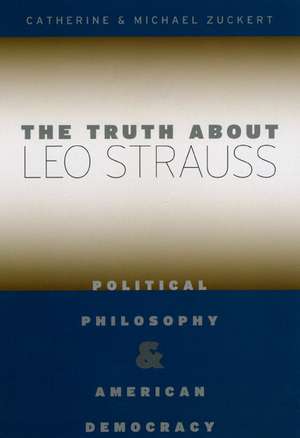The Truth about Leo Strauss: Political Philosophy and American Democracy
Autor Catherine H. Zuckert, Michael P. Zuckerten Limba Engleză Paperback – 24 apr 2008
Is Leo Strauss truly an intellectual forebear of neoconservatism and a powerful force in shaping Bush administration foreign policy? The Truth about Leo Strauss puts this question to rest, revealing for the first time how the popular media came to perpetuate an oversimplified view of a complex and wide-ranging philosopher. In doing so, it corrects our perception of Strauss, providing the best general introduction available to the political thought of this misunderstood figure.
Catherine and Michael Zuckert—both former students of Strauss—guide readers here to a nuanced understanding of how Strauss’s political thought fits into his broader philosophy. Challenging the ideas that Strauss was an inflexible conservative who followed in the footsteps of Nietzsche, Heidegger, and Carl Schmitt, the Zuckerts contend that Strauss’s signature idea was the need for a return to the ancients. Through their work, they conclude that Strauss was a sober defender of liberal democracy, aware of both its strengths and its weaknesses.
Balanced and accessible, The Truth about Leo Strauss is a must-read for anyone who wants to more fully comprehend this enigmatic philosopher and his much-disputed legacy.
“The Truth about Leo Strauss is the most balanced and insightful book yet written about Strauss’s thought, students, and political influence. It dispels myths promulgated by both friends and foes and persuasively traces the conflicting paths that American thinkers indebted to Strauss have taken.”—William Galston, Brookings Institution
Catherine and Michael Zuckert—both former students of Strauss—guide readers here to a nuanced understanding of how Strauss’s political thought fits into his broader philosophy. Challenging the ideas that Strauss was an inflexible conservative who followed in the footsteps of Nietzsche, Heidegger, and Carl Schmitt, the Zuckerts contend that Strauss’s signature idea was the need for a return to the ancients. Through their work, they conclude that Strauss was a sober defender of liberal democracy, aware of both its strengths and its weaknesses.
Balanced and accessible, The Truth about Leo Strauss is a must-read for anyone who wants to more fully comprehend this enigmatic philosopher and his much-disputed legacy.
“The Truth about Leo Strauss is the most balanced and insightful book yet written about Strauss’s thought, students, and political influence. It dispels myths promulgated by both friends and foes and persuasively traces the conflicting paths that American thinkers indebted to Strauss have taken.”—William Galston, Brookings Institution
Preț: 153.71 lei
Preț vechi: 185.51 lei
-17% Nou
Puncte Express: 231
Preț estimativ în valută:
29.41€ • 30.79$ • 24.48£
29.41€ • 30.79$ • 24.48£
Carte indisponibilă temporar
Doresc să fiu notificat când acest titlu va fi disponibil:
Se trimite...
Preluare comenzi: 021 569.72.76
Specificații
ISBN-13: 9780226993331
ISBN-10: 0226993337
Pagini: 316
Dimensiuni: 152 x 229 x 18 mm
Greutate: 0.44 kg
Editura: University of Chicago Press
Colecția University of Chicago Press
ISBN-10: 0226993337
Pagini: 316
Dimensiuni: 152 x 229 x 18 mm
Greutate: 0.44 kg
Editura: University of Chicago Press
Colecția University of Chicago Press
Notă biografică
Catherine and Michael Zuckert are both Nancy R. Dreux Professors of Political Science at the University of Notre Dame. Catherine is the author of two books, including Postmodern Platos, also published by the University of Chicago Press. Michael is the author of three books, including Natural Rights and the New Republicanism.
Cuprins
Preface
Introduction: Mr. Strauss Goes to Washington?
Introduction: Mr. Strauss Goes to Washington?
Part I: Strauss
Chapter One. The Return to the Ancients: An Overview of the Straussian Project
Strauss's Philosophical Project
Strauss's Departure from Heidegger and Nietzsche
Strauss's Analysis of the Contemporary Crisis
Strauss's Way Back to Ancient Political Philosophy
Strauss's Rereading of the History of Philosophy
Political Philosophy and Politics
Chapter Two. Strauss—Modernity—America
Proposition 1: America Is Modern
Proposition 2: Modernity Is Bad
Proposition 3: America Is Good
Straussian Ambiguities
Chapter Three. Leo Strauss as a Postmodern Political Thinker
The Problem of the Postmodern
Strauss's Postmodernism: After Nietzsche
Strauss's Postmodernism: After Heidegger
Derridean Postmodernism
Contrasting the Two Forms of Postmodernism
Chapter Four. The Man Who Gave Away the Secrets: On Esotericism
How Shadia Drury Read Leo StraussXT-DECORATION: none; text-underline: none"On Esotericism and Noble Lies
Looking for Secrets in All the Wrong Places
Chapter Five. Leo Strauss—Teacher of Evil?
Strauss and the "Tyrannical Teaching"
The Thrasymachean Thesis
The Machiavellian Moment
Strauss and Schmitt
Part II: Straussians
Chapter Six. The Emergence of the Straussian Study of America
Water Berns: The Virtuous Republic
Martin Diamond: Finding the Founding
Harry Jaffa: Aristotelianizing America
Chapter Seven: Straussian Geography
Conclusion
Notes
Index
Strauss's Philosophical Project
Strauss's Departure from Heidegger and Nietzsche
Strauss's Analysis of the Contemporary Crisis
Strauss's Way Back to Ancient Political Philosophy
Strauss's Rereading of the History of Philosophy
Political Philosophy and Politics
Chapter Two. Strauss—Modernity—America
Proposition 1: America Is Modern
Proposition 2: Modernity Is Bad
Proposition 3: America Is Good
Straussian Ambiguities
Chapter Three. Leo Strauss as a Postmodern Political Thinker
The Problem of the Postmodern
Strauss's Postmodernism: After Nietzsche
Strauss's Postmodernism: After Heidegger
Derridean Postmodernism
Contrasting the Two Forms of Postmodernism
Chapter Four. The Man Who Gave Away the Secrets: On Esotericism
How Shadia Drury Read Leo StraussXT-DECORATION: none; text-underline: none"On Esotericism and Noble Lies
Looking for Secrets in All the Wrong Places
Chapter Five. Leo Strauss—Teacher of Evil?
Strauss and the "Tyrannical Teaching"
The Thrasymachean Thesis
The Machiavellian Moment
Strauss and Schmitt
Part II: Straussians
Chapter Six. The Emergence of the Straussian Study of America
Water Berns: The Virtuous Republic
Martin Diamond: Finding the Founding
Harry Jaffa: Aristotelianizing America
Chapter Seven: Straussian Geography
Conclusion
Notes
Index
